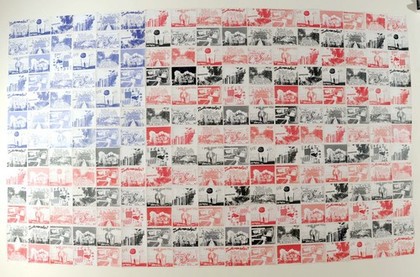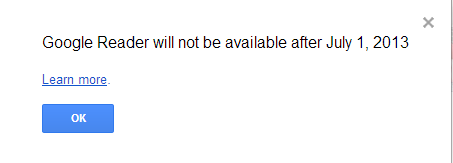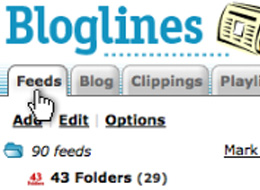The end of Reader and the trouble with filters
I am not sure how you managed to find this post today, but as most of us have heard by now, the demise of the once dominant feed reading platform Google Reader means you're certainly not reading it there.
Google Reader was for me, the primary mechanism where I discovered, (via the previously sunsetted 'shared items' feature), consumed, saved for future reference, and shared interesting content out to my friends and social networks. Reader was almost always an open tab for me in Chrome (Google please don't get any silly ideas about axing Chrome), and I easily checked it five or ten times a day. Most nights, the last thing I'd do was run through the 400 or so feed subscriptions I had to make sure I had not missed anything important, seen what my friends and colleagues were writing about, and most importantly for me, saved items for possible use as sources or ideas for blog posts, articles, HR Happy Hour Shows, etc.
Reader, more so than any other mechanism, became the primary filter through which I interacted with information and experienced what was going on in the world.
Sure over time, other and arguably better news and information tools began emerging, primarily developed to take advantage of the display and touch capabilities of iPads and smart phones. News readers like Pulse and Flipboard, and my personal favorite Zite, have taken news and content discovery and consumption into the modern technology age. They look great, they are fun to use, and they continue to get better at presenting content in personalized ways. Zite, when given feedback in the form of 'likes' and 'dislikes', over time will 'learn' what content you'd probably be most interested in, and will then serve up more of the content it expects you want to see, and less of what you don't.
So while I still relied on Reader as my primary source of news and information, tools like Pulse and Zite began to fill in some of the gaps and problems that Reader, (and really my use of Reader), exposed. Namely, unless you actively sought out new and different sources of information, you'd pretty easily fall into the trap of reading the same kinds of information sources all the time, and perhaps more importantly, you'd end up reading (again mostly), the same things everyone else you knew was reading too.
And if you spend a lot of time hanging out with the same kinds of people that read the same kinds of things, well, that all can get kind of boring kind of quickly.
The demise of Reader should not simply be an exercise in finding and replicating how we used Reader in some other tool. Rather it should be an impetus for all of us that love to read, that love to be challenged by new ideas, that are looking for perspectives that are different from our own, (and that of our friends), to more actively seek out and share something that is just a little bit different, just a little out of our comfort zone, and maybe something that is not the same thing everyone else is reading too.
Since Reader is gone, we have a chance and a reason to think a little bit more expansively, and to loosen up the filters that we were comfortable with, and that we applied to ourselves and to how we experience the world.
What are you reading that is different or interesting or makes you a little uncomfortable?

 Steve
Steve

